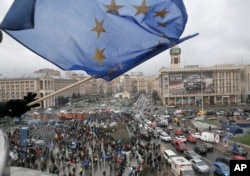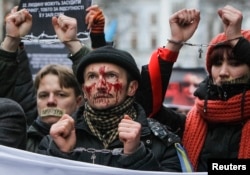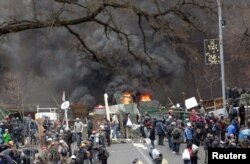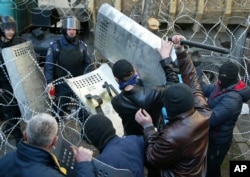UKRAINE: Key events leading up to the annexation of Crimea and the continuing conflict with Russia
November, 2013
Nov 21: Ukraine suspends plans to sign an association agreement with the European Union. Protests begin.
Nov 25: Ukrainian President Viktor Yanukovich defends his decision to scrap the EU deal and pledges to create a country up to European standards. Protests continue.
Nov 30: Riot police raid protest gatherings in Kyiv, arresting dozens and injuring protesters. Protesters occupy Kyiv's city hall the next day.
December
Dec 17: Russia offers $15 billion in loans and slashes gas prices following talks between President Viktor Yanukovich and Russian President Vladimir Putin.
January, 2014
Jan 16: Ukraine's parliament passes an anti-protest law that bans unauthorized tents in public areas and forbids slandering government officials.
Jan 22: Protests intensify in Kyiv and spread across Ukraine. Two protesters are shot and killed in Kyiv.
Jan 25: President Yanukovich offers government posts to top opposition leaders.
Jan 28: Prime Minister Mykola Azarov resigns and parliament repeals the new laws restricting protests.
Jan 29: Parliament approves a law offering amnesty to detained protesters if demonstrators abandon occupied buildings.
Feburuary
Feb 16: Protesters leave government buildings in Kyiv they had occupied for two months. Arrested protesters are granted amnesty the next day.
Feb 18: Police storm protest camps in Kyiv. At least 18 protesters and police are killed in the violence.
Feb 20: Battles erupt in Kyiv, despite a truce announced a day earlier. At least 39 people are killed.
Feb 21: Ukraine's president and three opposition leaders sign a deal to end the political crisis. Earlier, President Yanukovych said Ukraine would hold early elections and promised to form a coalition government.
Feb 22: Ukrainian opposition leader Yulia Tymoshenko is freed from the hospital where she had been held under prison guard for most of the time since she was convicted in 2011.
Feb 23: Ukraine's parliament selects Oleksandr Turchynov to serve as interim leader following the ouster of President Viktor Yanukovych. A day later an arrest warrant is issued for the former president.
Feb 26: Pro-Russia demonstrators and those supporting Ukraine's new pro-Western interim government confront each other in the southern city of Simferopol.
Feb 28: The ousted Ukrainian president gives a televised press conference from Russia, saying he was forced to leave his country, and is ready to fight for the future of Ukraine. Ukraine's interior minister said Russian forces have taken control of the two main airports in Ukraine's Crimea region.
March
Mar 2: Ukrainian Prime MinisterArseniy Yatsenyuk says "we are on the brink of disaster" and he urged Russian President Vladimir Putin to pull back his military from the country.
Mar 4: Russian President Vladimir Putin says his country is prepared to use all options to protect Russians in Ukraine. US Secretary of State John Kerry arrives in Kyiv, and announces $1 billion in aid.
Mar 5: The top diplomats from Britain and the United States call for face-to-face talks between Russia and Ukraine.
Mar 6: The vote by Crimean lawmakers came as EU leaders gathered for an emergency summit in Brussels to discuss how to pressure Russia to back down from its military incursion into Crimea. U.S. President Barack Obama and Russian President Vladimir Putin discuss Ukraine by telephone.
Mar 9: German Chancellor Angela Merkel and British Prime Minister David Cameron tell Russian President Vladimir Putin they believe the referendum in Crimea violates Ukraine's constitution and international law.
Mar 14: U.S. Secretary of State John Kerry and Russian Foreign Minister Sergei Lavrov meet in London.
Mar 16: Crimean election authorities say an overwhelming majority of voters support secession and joining Russia.
Mar 17: President Barack Obama announced U.S. sanctions during a televised address from the White House. EU leaders also put sanctions in place.
Mar 18: Russian President Vladimir Putin says Ukraine's Crimea region has always been an "inalienable" part of Russia as he outlined Crimea's importance to Russia in a speech before the Russian parliament.
Mar 19: Pro-Russian forces take control of Ukraine's navy headquarters in the Crimean port of Sevastopol, a day after Russia signed a treaty with local authorities to make Crimea part of Russia.
Mar 21: Russian President Vladimir Putin signs into law legislation completing the annexation of Crimea, calling it a "remarkable event." Ukraine signs an agreement on closer political cooperation with the European Union.
Mar 22: Russian troops take control of the base in Crimea. Ukrainian forces offer no resistance.
Mar 23: Ukrainians gather in Kyiv's Independence Square for a demonstration to call for unity.
Mar 24: In a joint statement issued on the sidelines of a nuclear security summit in The Hague, the leaders of the U.S., Britain, Canada, France, Germany, Italy and Japan say they were suspending their participation with Russia in the G8, until Moscow "changes course."
Mar 25: President Barack Obama and other world leaders discuss Ukraine at a nuclear summit in The Hague.
Mar 27: The head of Ukraine's national security council says Russia has close to 100,000 troops along Ukraine's borders in the north, south, and east. Russia says the soldiers are involved in "springtime exercises."
Mar 28: President Barack Obama says Russia must pull back its troops from the Ukrainian border and begin negotiating to defuse tensions.
Mar 30: Kerry and Lavrov discuss ways to de-escalate the crisis in Ukraine following Russia's annexation of the Crimean peninsula.
April
Apr 1: NATO foreign ministers suspend civilian and military cooperation with Russia, but say political dialogue can continue as necessary.
Apr 6: Pro-Russian protesters storm government buildings in the eastern Ukrainian cities of Donetsk, Luhansk and Kharkiv.
Apr 8: Russian Foreign Minister Sergei Lavrov says Russia wants to see those regions, which are largely Russian-speaking, represented in multilateral talks.
Apr 9: Interior Minister Arsen Avakov says pro-Russian protesters occupying government buildings in eastern Ukraine have until the end of the week to vacate and enter negotiations.
Apr 10: NATO releases satellite images showing what it says are thousands of Russian troops near Ukraine's border, along with tanks and aircraft.
Apr 13: Russia is heavily criticized at the Security Council meeting as deadly clashes between pro-Russian separatists and pro-government supporters erupt in eastern Ukraine.
Apr 14: Protesters defy a government deadline to vacate occupied buildings while Ukraine's interim President Oleksandr Turchynov says he is open to holding a referendum on what kind of country Ukraine should be. (http://gdb.voanews.com/FB78B0BB-9FEE-4661-8581-1B1F400DA80F.jpg)
Apr 20: The Easter Sunday truce lasts a few hours before a deadly gunfight at a checkpoint in the pro-Russian eastern city of Slovyansk. (http://gdb.voanews.com/7AFCB3D9-5066-47A2-AE9E-75F3BE70288F.png)
Apr 22: U.S. Vice President Joe Biden says the United States is ready to help Ukraine's economy, but warns that they must fight the "cancer" of endemic corruption. (http://gdb.voanews.com/5A2B6E09-D4D3-4A7D-AEAA-A338F2BB813D.png)
Apr 23: U.S. Army paratroopers land in Poland to start maneuvers aimed at easing anxieties in allied eastern European countries alarmed by developments in Ukraine.
Apr 25: Arseniy Yatsenyuk says Russia wants to occupy Ukraine militarily and politically. (http://gdb.voanews.com/F19D287B-ABF8-4FE9-9196-258B4DDA3AC3.jpg)
Apr 27: The German-led monitoring team was seized by separatists in Slovyansk on April 25. They told reporters they are in good health and not being mistreate. (http://gdb.voanews.com/E221BFAF-689E-4C06-8751-17AF6910C010.jpg)
Apr 29: U.S. Treasury Secretary Jack Lew says the sanctions have caused a substantial deterioration in Russia's economy.
Apr 30: Interim President Oleksandr Turchynov says his government cannot quell the pro-Russian separatist movement in two eastern regions.
May
May 1: Ukraine made the move shortly after Russian President Vladimir Putin demanded Ukraine withdraw its military from the region near the Russian border.
May 2: Dozens are killed in a building fire that broke out during fighting in the port city. (http://gdb.voanews.com/602AFBB0-CB44-4FAA-A214-CD69CC41B295.jpg)
May 4: Pro-Russian militants storm a police station in Odessa and free dozens of people arrested in clashes the day before. (http://gdb.voanews.com/33974CCA-8A05-4779-9694-A421817EC813.jpg)
May 6: U.S. Secretary of State John Kerry says if Russia interferes with Ukraine's May 25th presidential election, the United States will impose more sanctions that he says will have a bigger bite on the Russian economy.
May 8: Russia makes the demand after it said Ukraine missed a deadline to pay down a $3.5 billion energy debt.
May 9: Government forces smash through barricades surrounding a building occupied by pro-Russian separatists. As many as 20 people are killed.
May 11: Separatists say 89% voted for independence in Donetsk while results in Luhansk were not immediately available. Ukraine described the vote as a 'criminal farce' and the U.S. denounced it as illegal. (http://gdb.voanews.com/AF31EC84-4D5F-4834-AE43-0E54BA3673E8.jpg)
May 12: The region asks Moscow to consider letting it join Russia. U.N. Secretary-General Ban Ki-moon calls for an end to the undermining of Ukraine's territorial integrity.
May 13: U.S. Secretary of State John Kerry said that with presidential elections set for May 25th in Ukraine, its people should be able to forge their own destiny. Earlier in the day, pro-Russian separatists killed seven Ukrainian soldiers in an ambush near Kramatorsk.(
May 14: Ukraine opens talks without the participation of pro-Russian separatists seeking autonomy from Kyiv in the country's east and southeast. (http://gdb.voanews.com/8E3E01B8-D13F-4A90-BC28-928C7CD42377.jpg)
May 15: The two countries say more economic sanctions will be put in place if Russia tries to disrupt Ukraine's May 25th presidential election.
May 16: The 36-page report cites examples of targeted killings, torture and
beatings, as well as abductions, intimidation and sexual harassment,
largely carried out by what it calls well-armed anti-government groups
in eastern Ukraine.
May 18: The billionaire businessman far outpaces competitors in pre-election polls. (http://gdb.voanews.com/4B805658-6EE5-47E0-879C-882BA8D36678.jpg)
May 20: The U.S. vice president condemned Russia's annexation of the Crimean peninsula. (http://gdb.voanews.com/8EAF8104-7676-496E-A27A-FBF7B5426C2C.jpg)
May 21: The Russian president questions the legitimacy of Ukraine's upcoming election, but says Russia will move troops away from the border.
May 22: Ukrainian officials say pro-Russian separatists killed 13 soldiers in an attack on a military checkpoint.
May 23: Vladimir Putin says he will recognize the outcome of Ukraine's presidential election and says he hopes the winner will end military operations against separatists in the east.
May 25: Exit polls show former foreign minister and billionaire candy maker Petro Poroshenko winning the vote.
May 26: Battles erupt at the airport when separatists storm the terminals, prompting government airstrikes. (http://youtu.be/S3MWjFCoIFo)
May 27: The White House says he offered the 'full support' of the U.S. in moving Ukraine forward.
May 29:Acting President Oleksandr Turchynov says 14 servicemen were killed when "terrorists" used a shoulder-launched missile to down the helicopter near the separatist-held city of Slovyansk.
May 30: Ukraine's acting defense minister vows to continue a military offensive against pro-Russian rebels in the country's east until peace and order are restored.
June
June 4: Pro-Russian separatists overrun a key base and a border post after hours of fighting.
June 6: The Russian president met Ukraine's president-elect and President Obama on the sidelines of a ceremony in France marking the 70th anniversary of D-Day. The meetings came after President Putin spoke with the leaders of Germany, Britain and France Thursday and Friday.
June 7: Ukraine's new president says Crimea 'is, was and will be Ukrainian.' (http://gdb.voanews.com/95BFD626-2ADB-4CC5-8429-B0BF1ABF6F77.jpg)
June 9: Ukraine's Foreign Ministry says it reached a mutual understanding with Russia on key stages of a peace plan for eastern Ukraine.
June 13: The State Department says Russia sent tanks, rocket launchers and other vehicles to separatists in eastern Ukraine.
June 14: Ukrainian officials say 49 people were killed when rebels shot down an Air Force plane.
June 15: Gazprom cuts its supplies to Ukraine after Kyiv fails to pay an outstanding debt. (http://gdb.voanews.com/439EB4EC-D10B-40B4-A546-11C8EF0F4F0A.jpg)
June 17: The Kremlin says the two leaders discussed a possible cease-fire in southeastern Ukraine.
June 20: Ukraine's president declares the weeklong cease-fire, but says it will not prevent Ukrainian forces from fighting back if attacked. Pro-Russian separatists reject the cease-fire.
June 22: He says a peace deal should ensure the rights of all Russian-speaking people in Ukraine's east.
June 25: The White House says the Obama administration is ready to impose more sanctions on Russia if Moscow fails to take action to de-escalate the crisis in Ukraine.
June 27: Ukraine's president signs the free trade agreement, drawing negative reaction from Russia.(http://gdb.voanews.com/D165549B-DA95-4CAA-AAC7-54BB2652FCE6.jpg)
June 28: Pro-Russian rebels free the four monitors after a month of detention. Four others were released earlier in the week.(http://gdb.voanews.com/18916845-18C0-4E86-9B59-8C0009359BD0.jpg)
June 30: Ukraine's president says he will not renew the unilateral cease-fire and vows to mount new attacks on pro-Russian separatists.
July
July 4: Ukrainian troops overtake Slovyansk, which had been seized by rebels in April. Pro-Russian rebels fled after coming under mortar attack.(http://gdb.voanews.com/4B4EABEE-7E1E-4A2F-905B-72A1C115DF18.png)
July 7: Retreating pro-Russian separatists build barricades and erect checkpoints around the city. Bridges linking the city with Slovyansk are destroyed. (http://gdb.voanews.com/65FBD742-6DE9-4F77-880C-997C0CCD32C8.jpg)
July 10: Amnesty International says pro-Russian separatists have used beatings and torture in eastern Ukraine.
July 11: Ukraine's Defense Ministry says a rocket attack killed 19 troops and wounded 93 others in Luhansk, near the Russian border.(http://gdb.voanews.com/4B4EABEE-7E1E-4A2F-905B-72A1C115DF18.png)
July 14: Pro-Russian separatists say they shot down a Ukrainian military transport plane and took four crew members prisoner.
July 16: President Obama announces new economic sanctions on Russian banks and energy companies.(http://gdb.voanews.com/DBA61321-4CAE-4E90-8678-514F0E299346.png)
July 17: The Boeing 777 with 298 people on board was shot down and crashed in Ukraine's Donetsk region in an attack the West has blamed on separatist rebels armed by Russia.(http://gdb.voanews.com/4377F160-838F-4551-A67D-A418EC98D324.jpg)
July 20: The U.S. secretary of state condemned Russia on Sunday news shows for 'overwhelming evidence' of complicity in the shootdown of Flight MH-17.
July 23: Rebels claimed responsibility for downing the jets in the same region where a Malaysian passenger plane was shot down.
July 24: Arseniy Yatsenyuk says he is stepping down after his ruling coalition collapsed.
July 29: US Ambassador to Ukraine Geoffrey Pyatt says “We have high confidence that Malaysia Flight 17 was brought down by an SA-11 missile, fired from territory controlled by the separatists."
August
Aug 1: A team around 100 international investigators and police was able to visit Friday the crash site of Malaysian Airlines flight 17 in eastern Ukraine. The inspectors had been forced to turn back several times this week due to heavy fighting between Ukrainian government and pro-Russian rebel forces. (http://gdb.voanews.com/81335A3E-7828-4B48-A2A6-9B5EBADC9691.png)
Aug 5: NATO official says that Russia has Russia significantly increased the number of troops in the vicinity of the Russian border, including about 20,000 troops, tanks, infantry, artillery, air defense systems, as well as logistics troops, special forces, and various aircraft.
Aug 7: Russia announces a ban on imports of food and agricultural products from the United States, Europe and other Western countries. It’s in retaliation for sanctions imposed by the West. (http://gdb.voanews.com/382219CE-95FB-4E7C-8FA9-66F359DBA3F6.png)
Aug 11: Putin says that Russia intends to to send humanitarian aid to the thousands of people in Ukraine's Russian-speaking east who are short of water, medical aid and electricity.
Aug 26: Ukrainian officials say they have captured Russian soldiers on Ukrainian territory -- the latest accusation of Moscow's involvement in the conflict in eastern Ukraine.
September
Sep 2: Under Kyiv's current $17 billion IMF bailout, the IMF said Ukraine will not be able to meet all of its financial obligations due to the ongoing fighting and an intensified gas dispute with Russia, which supplies the bulk of Ukraine's natural gas needs.
Sep 9: Tensions between Russia and the West over the future of Ukraine spurs the European Union to renew efforts to end decades of dependence on Russian gas, prompting the EU trade commissioner to say the U.S. should commit to exporting oil and natural gas to Europe under a transatlantic trade deal.
Sep 9: A Dutch Safety Board report finds no sign of either technical problems nor pilot error as the cause of the Malaysia Airlines MH 17crash nearly two months earlier. (http://gdb.voanews.com/96151D51-896F-4F10-A82B-8BA7A2EA6C08.png)
Sep 12: New EU sanctions go into effect targeting firms in Russia's energy sector, including Rosneft, Russia's largest oil company, Gazprom Neft, the oil unit of Russia's giant natural gas monopoly Gazprom, and Transneft, Russia's pipeline operator, and three large defense firms,
preventing the companies from raising money in the EU market. (http://gdb.voanews.com/8862FAE3-CF44-40DD-82F8-2FA62BE3EB93.png)
Sep 15: The U.S. military leads peacekeeping exercises in western Ukraine involving 15 nations, lasting until Sept. 26, 2014, calling it Exercise Rapid Trident, near Yavoriv, western Ukraine. (http://gdb.voanews.com/BFC831C5-D268-4D02-A4C1-5CB0E7131406.png)
Sep 16: Ukraine's parliament adopts legislation granting greater autonomy to the separatist regions in the east of the country. Ukraine's parliament also ratifies a landmark political and trade agreement with the EU, whose rejection last November by the previous Kyiv government under president Viktor Yanukovych led to massive street protests that culminated in his ouster in February. (http://gdb.voanews.com/53BC6FB1-C7EC-4AC1-94DF-28EFFCB683F0.png)
Sep 17: President Poroshenko presses for greater U.S. support during his talks with President Barack Obama.
Sep 20: Participants at Ukrainian peace talks in Belarus agree to create a buffer zone 30-kilometers wide, moving artillery on the front line to separate Ukrainian government troops and pro-Russian separatists.
Sep 28: Ukrainians in the eastern city of Kharkiv topple one of its most prominent Russian symbols - a statue of Soviet icon Vladimir Lenin. (http://gdb.voanews.com/9AC050CE-A9CA-465E-8E6E-3DCA14B5A4E7.png)
October
Oct 27: President Barack Obama congratulates the people of Ukraine on ‘holding successful parliamentary elections’ Sunday, Oct. 26, as a partial vote count shows pro-Europe parties are decisively ahead in the poll. (http://gdb.voanews.com/026EA5A4-DA83-4760-97CC-62A0B7165A8E.png)
November
Nov 3: Pro-Russian separatists in eastern Ukraine say the acting prime minister of the so-called Donetsk People's Republic has won an election that Kyiv and the West have made clear they will not recognize. (http://gdb.voanews.com/E91E82A9-9A5B-4F3D-856E-D97F3EF122CF.png)
Nov 10: Fresh reports of violence and convoys of heavy weaponry on the move in eastern Ukraine increase doubts about the viability of a shaky cease-fire reached between Kyiv and Russia-backed separatists in September. (http://gdb.voanews.com/60550F57-C62A-44F4-970B-81C1F78C8561.jpg)








